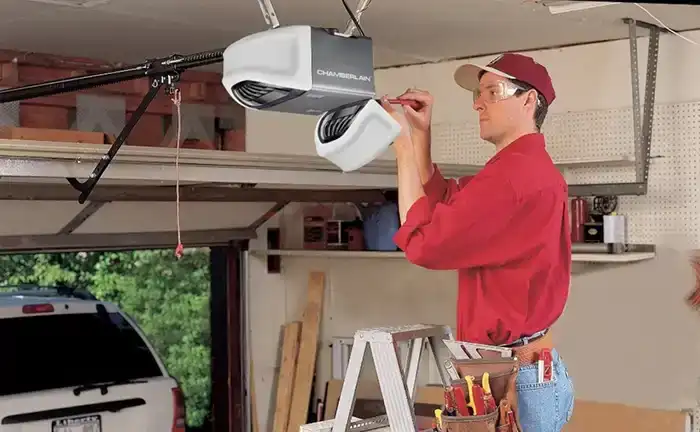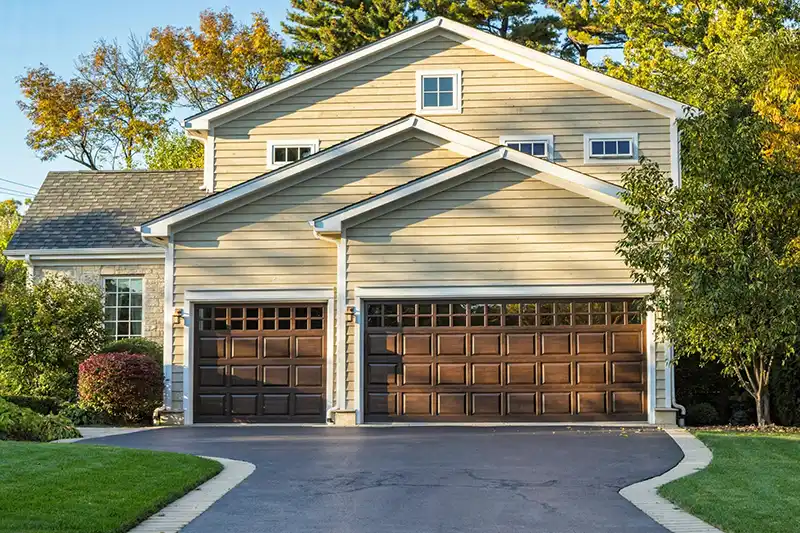Garage door systems are surprisingly complex. As a result, homeowners often have questions about their system, especially when something goes wrong. We assembled some of the more common questions we get into this garage door FAQ. If you have questions that aren't here, feel free to reach out using our contact form and we'll be happy to help!
Why does my garage door reverse when closing?
This is a common question in any garage door FAQ. Federal law requires that your garage door be equipped with an auto reverse safety feature to prevent a door closing on obstructions including people or pets. A garage door opener has a sensor that detects resistance when it’s closing and automatically reverses when it does.
There are several things that can trigger the auto reverse. The obvious reasons include an object blocking the door like a bicycle or a box. People or pets would also cause the door to reverse (thankfully). In addition to that, if there are problems with your doors track alignment or other door system faults that cause resistance when closing, the opener may interpret that as an obstruction and initiate an auto reverse. Finally, a faulty opener controller board could also cause unpredictable behavior. If there are no obvious obstructions and your door reverses for unknown reasons, even sporadically, it’s best to call for service to avoid any safety risks.
Why should I hire a garage door professional?
Garage doors are heavy and as such involve a lot of forces, particularly the torsion springs. These springs, which have limited lifespans, are under a tremendous amount of tension and if that force is released unexpectedly, bad things can happen. In addition to the springs, the other components of your garage door system routinely see plenty of weight and pressure and can easily crush fingers if not handled correctly. So the number one reason to have your door serviced by a professional is safety.
The other consideration is the value of your garage door. A garage door that is not serviced properly can lead to complete garage door failure resulting in damage to vehicles and property inside the garage. It could also require a whole new garage door installation which will be much more expensive than any service call.
Our advice: don’t mess around with your garage door. For safety’s sake alone, always call a garage door repair professional for service.
Is replacing a garage door spring dangerous?
Probably the most important question in our garage door FAQ. In the wrong hands, they can be. Garage door springs are used to help open and close the garage door by storing potential force in the spring. When a garage door spring fails, it can unleash a tremendous amount of force causing harm to property or people nearby. Installing or replacing a spring presents similar danger when the proper care is not used. Play it safe, always get a professional to inspect and replace your springs.
Is there a way to close my garage door manually?
Yes, but once again, start with caution. If your door won’t close all the way or won’t close at all using the automatic garage door opener, the first question is why? If the opener seems to be working but the door is “auto-reversing” at some point, the opener is either defective or is sensing an obstruction. Check for objects that may be blocking the garage door path. If there are no obvious obstructions, check for broken springs. A broken spring won’t provide the assist the opener needs and the opener will interpret that as an obstruction, resulting in the auto reverse.
You can try disengaging the door from the opener by pulling the manual release cord if the spring is broken or there is some other defect. Important: make sure someone is preventing the door from crashing down when the release is pulled to prevent any damage or harm. Make sure there are no children or pets present in the area!
Should I lubricate my garage door springs?
Certain types of garage door springs need periodic lubrication. To clarify, if your garage door uses extension springs, no lubrication is necessary. Extensions springs stretch or “extend” resulting in little friction. On the other hand, torsion springs are wound up or down as the garage door opens or closes resulting in friction as the coils rub against each other. If you have powder coated torsion springs, no lubrication is necessary.
That leaves the more common galvanized torsion spring which does benefit from periodic lubrication. It’s important to use the preferred lithium grease spray or a silicone spray. Importantly, never use WD-40 to lubricate your torsion spring (or other garage door components). That’s because WD-40 is a degreaser and will remove the all-important lubricating grease. To lubricate the torsions springs, with the help of a stepladder, simply spray a reasonable amount of lithium grease across the top of the spring from end to end. After spraying, open and close the door a few times to work the grease in. We recommend lubricating the torsion springs once or twice a year for optimal spring performance.
When to replace a garage door with a new one?
Homeowners deal with the new versus repair question all the time. Garage doors are no different – a new garage door installation is not a trivial expense. There are a few things to consider when it comes to replacing or repairing your garage door:
Damage to The Garage Door System
Damage to a garage door system can range from some slight paint peeling to major, structural damage than can pose safety hazards. If the damage to your door is minor, maybe a dent in one or more panels, cracks or paint issues, a repair may be a cost-effective solution. For many homes, the garage door accounts for a large percentage of what your home looks like from the road, having a direct impact on curb appeal. So repairing some dings and paint issues can be money well spent.
Major damage to structural components, which can pose safety hazards, can be more expensive and need to be weighed against the cost of replacement. A broken spring can be a routine repair, but if there is additional damage to the system, the repair cost may begin approaching replacement cost. In this case, the homeowner will want to factor in the age of the garage door in making their decision. Sawtooth can evaluate your situation and provide an estimate for repair versus replacement.
Age of Garage Door
Garage doors last between 15 and 30 years on average depending on many factors including usage, climate and quality of components. If your garage door is in that range, you may want to consider replacing the door rather than repairing for anything other than minor repairs. Remember, a new garage door has an excellent return on investment for home upgrades.
Cost
Of course, cost is always a factor. A $200 repair versus a $2000 new door may be an obvious decision. But the cost must also be weighed against the age of the door and the cost to replace. Once again, your local garage door experts can provide pricing guidance and advice on how best to proceed.
What questions should I ask when considering a new garage door installation?
Getting a new garage door is not a trivial purchase. A new garage door is not cheap and there are plenty of options to consider. Here are some questions to get your thought process started:
- What manufacturers do you recommend?
- Which garage door materials are best?
- What kind of garage door do I need?
- Which options should I consider?
- Should I upgrade the springs and rollers?
- Do you recommend an insulated garage door?
- What is the timeline for installing my new garage door?
- What type of guarantee or warranty is available if my garage door is damaged after installation?
- Do I need a new garage door opener?













